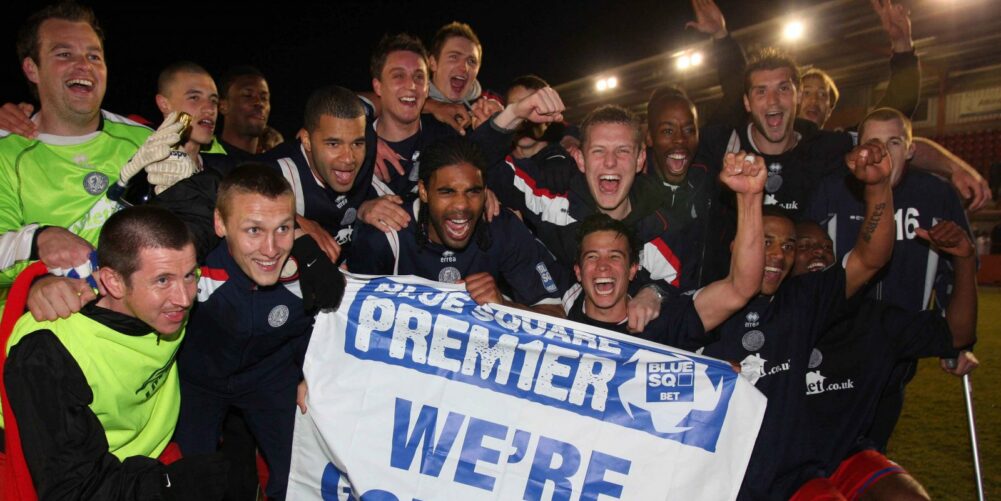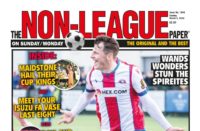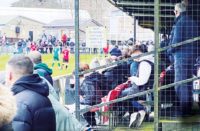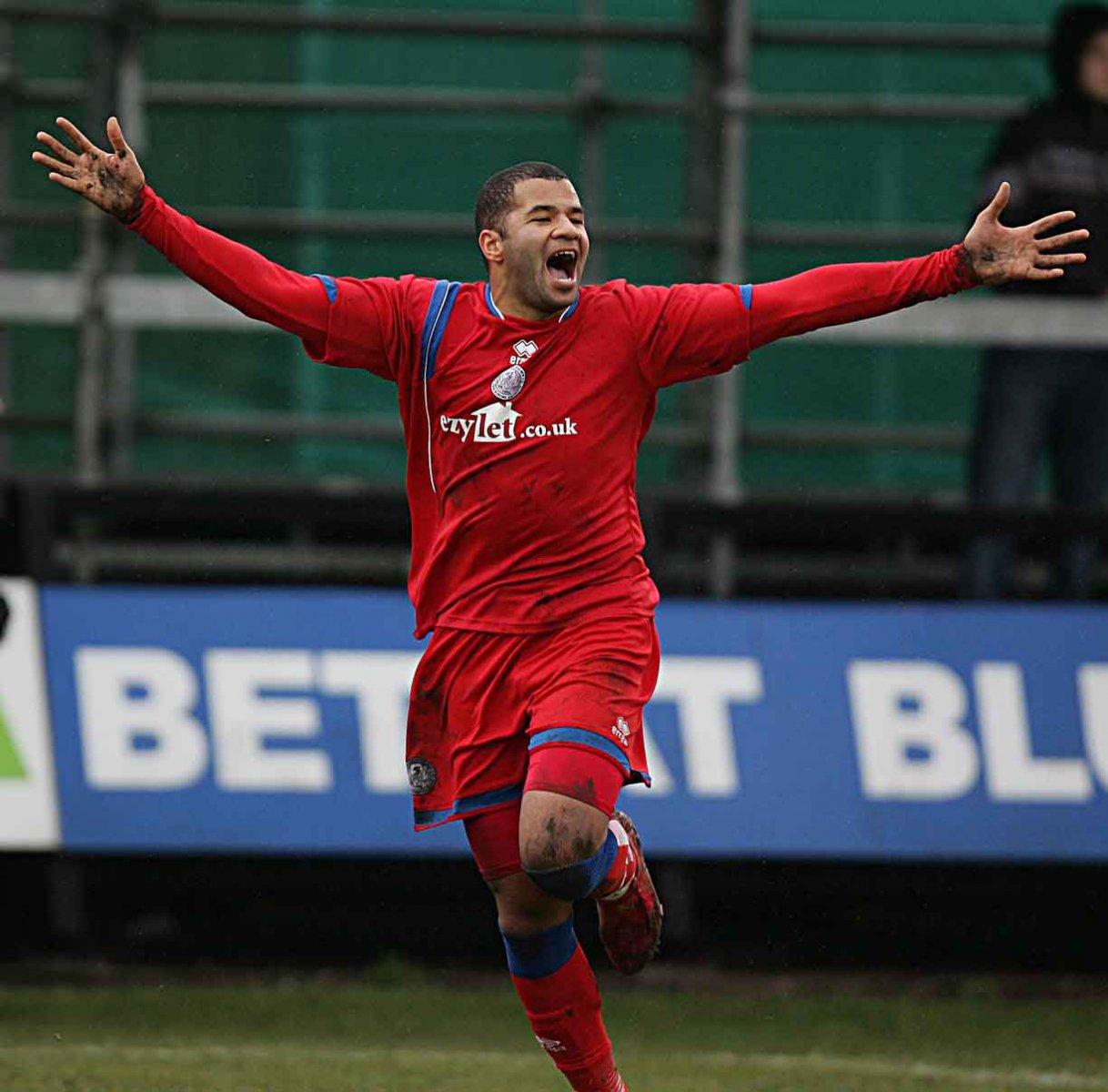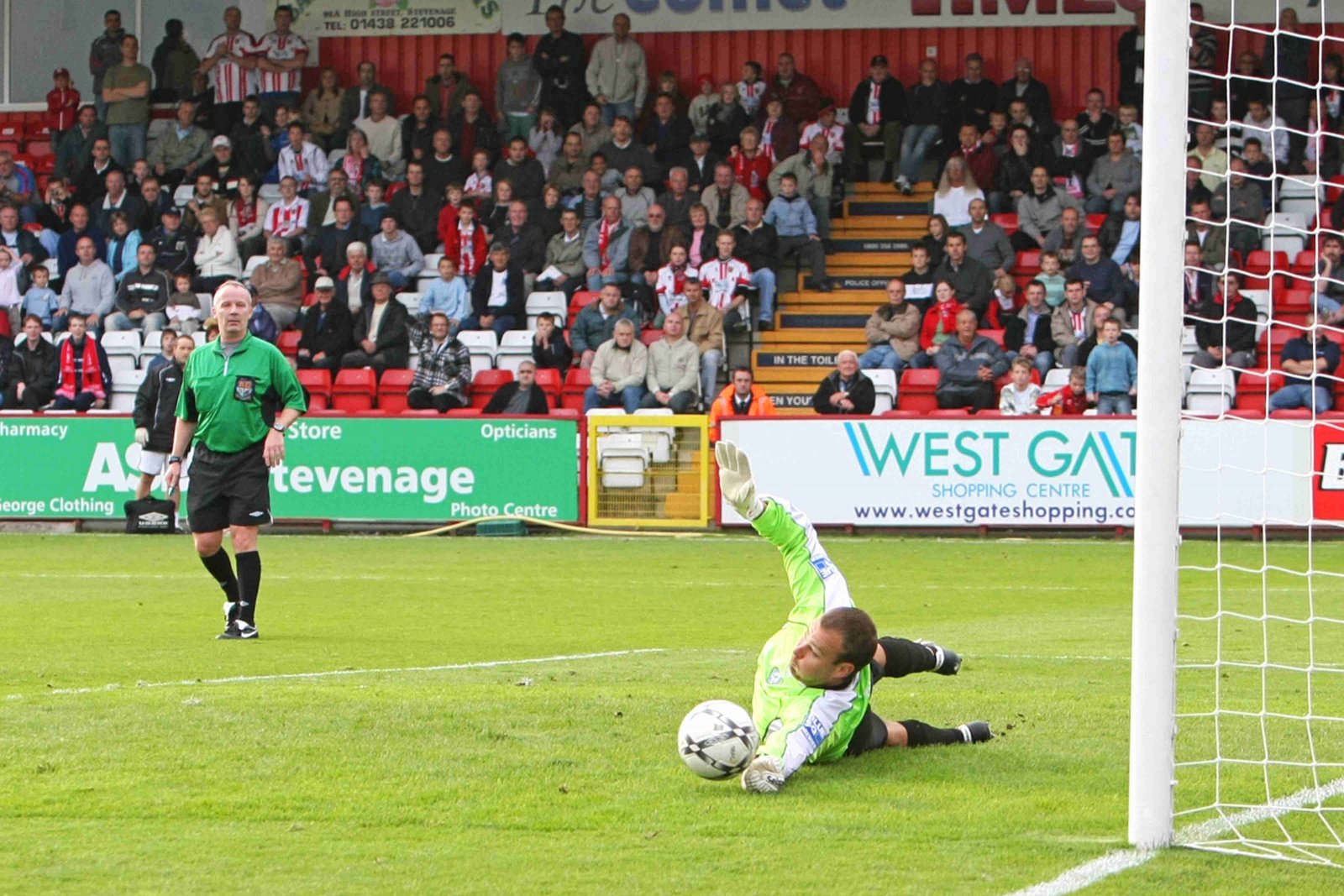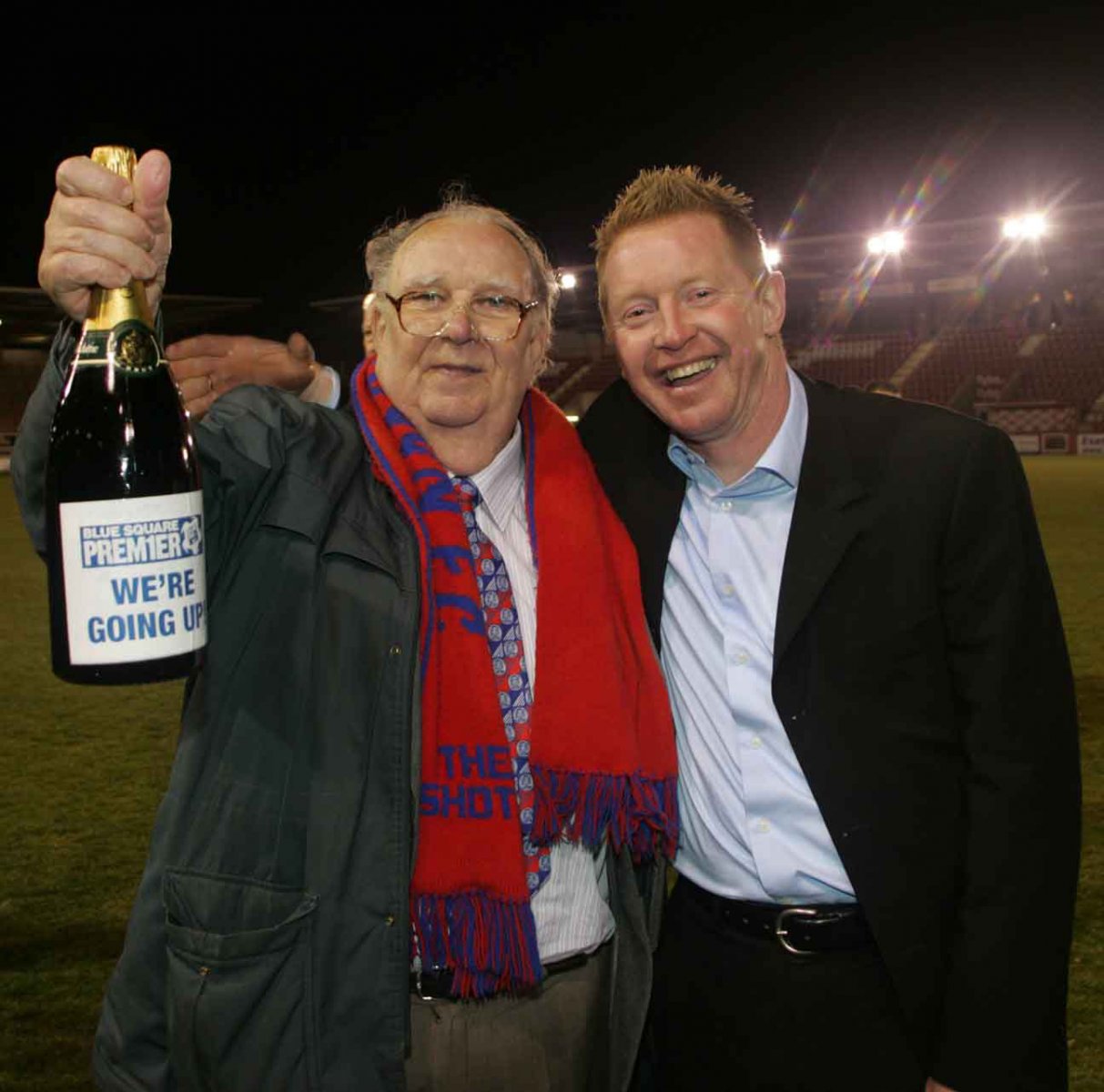In the latest of our summer series in The Non-League Paper, we take a look back to the 2007-08 season when Gary Waddock steered Aldershot Town back into the Football League to end a harrowing 16-year exile…
April, 2008. Aldershot Town are Conference champions. The Rec is heaving, 6,000 punters crammed into every crumbling cranny.
It is a day of celebration, a day when the result – a 0-0 draw with Weymouth – is utterly insignificant.
Because Aldershot, the club that refused to die, are back in the Football League after an agonising 16-year exile.
And for John McGinty, the club's beloved chairman, life in Non-League will end as it began – with a flagon of rum.
In February 1992, debt-ridden and penniless, Aldershot were wound-up in the High Court, the last Football League side to go bust.
Six months later, the club reformed and was placed in Isthmian Division Three. McGinty, a local businessman who'd made a fortune in the removals trade, was there on Day One.
Speaking in the midst of that 2007-08 campaign, he said: “Our first game was against Clapton, and their chairman, who was in the trade, gave us a canister of rum.
“It has sat in the directors' display cabinet for 16 years and, if we do go up, we will invite the chairman of Clapton to come down, watch our first game and crack open the rum.”
In the end, they didn't even wait that long. Forty-five minutes before Rhys Day lifted the Conference trophy, the squad of 1992-93 were joined on the pitch by Mike Fogg – the man who had donated that famous bottle of Pussers.
McGinty handed it over, and Fogg symbolically broke the seal. “This is our rum day,” he said. “But it won't be a bad day!”
Nobody deserved that moment like McGinty, who died in 2009 at the age of 72. The hard drinking, fun-loving Irishman was there for every milestone and every setback.
He it was who provided the cash to turn professional in 2006, even though it meant funding losses from his own pocket.
“I feel so proud that I am the chairman that has taken Aldershot back into the Football League,” he said afterwards. “But it's been every man jack of us – all those lads who are here today and all those who have left us along the way.”
Of those, nobody was more pivotal than Gary Waddock, whose appointment in the summer of 2007 turned 15-1 outsiders into record-breaking title winners.
Waddock played in the First Division for QPR and won 21 caps for Ireland during a distinguished top-level career. Yet the 45-year-old's arrival was no coup.
A year earlier, he'd replaced Ian Holloway as manager at Loftus Road in a romantic ascent from the club's academy. Having promised exciting football, Waddock delivered relegation form, dressing room rifts and a limp cup exit to Port Vale.
“I was pretty much written off as a manager,” concedes Waddock, who was demoted to first-team coach after just two months. “Going to Aldershot was a case of proving to people I could do the job.”
Stereotypes
Even McGinty admitted the appointment was “like sticking your hand into a draw” and hoping for the best. In fact, the Shots chief had struck gold.
Like everyone else at the Rec, McGinty watched with growing wonder as Waddock's men made a mockery of Non-League stereotypes.
No cloggers. No tin hats. No route one. Aldershot pressed high and passed low, dominating possession and – above all – attacking with furious conviction. The football Waddock had promised in Hammersmith was spectacularly delivered in Hampshire.
“We had flair, pace, imagination – it was brilliant,” says striker John Grant, who would finish as the club's top scorer with 25 goals.
“When I watched Man City last season, it reminded me of us back then. We didn't change for anyone and we didn't go anywhere looking for a draw. We went to attack and we went to win.
“It all came from Gary. Publicly, he'd say we were underdogs, that the division was full of bigger teams. Which was true. But behind closed doors he'd say how nobody could live with us.”
Waddock's work in the transfer market was equally inspired. Released by MK Dons, Ben Harding rocked up on trial and ended up playing every single game. Lewis Chalmers, the Mancunian Makelele, arrived from Altrincham to weight anchor on the centre spot.
Both, however, were eclipsed by Scott Davies. Signed on a season-long loan from Reading, there was little imposing about the skinny teenager with a ginger buzz cut.
Yet on the end of that spindly right leg was a jackhammer, honed by countless childhood hours on a Kickmaster – a ball tethered to a piece of elastic that was worn around the waist.
The season was just 46 minutes old when Davies launched a 25-yard exocet beyond Kidderminster's Scott Bevan for his first goal of the campaign. By the time it was over, he'd scored ten more – all from outside the box.
“Scotty is one of the best strikers of a ball I've ever played with,” adds Grant. “Once he hit it, it stayed hit. I think he had four or five goal of the season contenders.
Cohesion
“But it wasn't just his ability. He was bubbly, he'd wind people up and get them going. He came from a Premier League club and he could have thought ‘I shouldn't be here'. But his attitude was spot on.”
For that, Davies credits Martin Kuhl, Waddock's snarling pitbull of a right-hand man.
“He and Gary were chalk and cheese,” he says. “Martin was great for the young lads. He turned me into a man that season – I felt like I knew right and wrong for the first time in my career. But Gary was like a second father too.”
Waddock was also fortunate in the players he inherited. Grant, the club's reigning player of the year, had scored 23 goals the previous season.
Joel Grant and Jonny Dixon – who would net 17 times between them – both returned after successful loan spells in 2006-07. Homegrown centre-back Dave Winfield was maturing fast.
Ricky Newman – even at the grand old age of 36 – was the kind of cartoonish, larger-than-life jester that so often oils dressing room cohesion.
“Having Rick in the dressing room was probably worth 15 points,” says Nikki Bull, Aldershot's long-serving goalkeeper. “His sense of humour, his wit, his ability to relax everyone and take the pressure off – he was invaluable.
“Whenever I talk to lads from that team – Scott Davies, Scott Donnelly – it always comes back to Newmo. The only surprise is that he didn't go into stand-up when he finished playing because he was genuinely funny enough.”
Then, of course, there was Bull himself. Coached by Waddock as a kid at QPR, he'd joined the Shots in 2002 and was the last remnant of the side that reached the Conference play-off final under Terry Brown.
Pinnacle
“We'd lost in the play-off final to Shrewsbury, then in the semis to Carlisle,” he recalls. “We had a fantastic young squad with the likes of Adam Miller, Aaron McLean, John Nutter, Tim Sills.
“Slowly but surely they all moved on to bigger things and I started to think ‘Have we blown our big chance?'
“I had opportunities to move too but it never felt right. If Aldershot had got to the League, I'd always have looked back and regretted not being part of it.”
Privately, Bull told himself that the 2007-08 campaign would be his last shot at promotion – and he gave it everything.
“I don't think I've seen an individual have a better season,” says Waddock, who would later sign Bull for Wycombe. “He was as important as any centre-forward – he'd save you 20 goals a season. The amount of games and points he won us that year was amazing.”
A game against Forest Green in January showed just why Bull would eventually be named Conference Player of the Year by his peers. Aldershot lost 1-0, but might have shipped five had Bull not thwarted Stuart Fleetwood in a string of one-on-ones.
“It's weird, but when players went through one-on-one you would always feel as though the advantage was with us,” says Davies. “Nikki was phenomenal in those situations.”
Frequently, however, Bull was a bystander as Aldershot ran riot. Goals flowed. Points rose. Hope turned to optimism, then to genuine belief. Though briefly pursued by Torquay and Cambridge, Waddock's men soon streaked into the distance.
“Everyone was waiting for the crash,” recalls Waddock. “They looked at us, saw a young group of players and said ‘They'll blow up, they'll fall away, they can't keep it up'.
“But we just got stronger and stronger. The lads grew, as players and as people. They formed a strong bond. It was actually very reminiscent of the Leicester situation.”
(Cheers! Chairman John McGinty and Shots boss Gary Waddock)
In January, a 2-0 reverse at York marked the start of a 26-match run that would bring only one more defeat – to Ebbsfleet in the semi-finals of the FA Trophy.
A play-off berth was secured by March. The inaugural Setanta Shield clinched in April. Then, two weeks later, on a warm evening in Exeter, came the moment Shots fans had dreamed of since the dark days of 1992.
With a 1-1 draw at St James' Park, promotion was sealed. By the end, the Shots had racked up 101 points and 31 wins – both Conference records.
“I still remember talking to Martin Kuhl after that Exeter game,” says Grant. “He said ‘Granty, enjoy this moment. Take it all in. Some people play for 15 years and don't win a thing'.
“And he was spot on. I didn't win anything again, but I've memorised every last detail of that night at Exeter. In my career, it's the pinnacle. Better than making my League debut, better than reaching the play-off final. Better than anything.”
Those sentiments are echoed by Davies. “I've played in the Championship for Reading in front of 40-odd thousand at Newcastle,” he says. “But I still can't compare that to Aldershot. The spirit, the freedom – I felt like a kid in the park.”
Ambition
For one man, however, it went beyond simple enjoyment. Promotion felt like the culmination of a life's work.
“When I first signed for Aldershot, it was apparent how many people had dedicated their lives to rebuilding the club after the liquidation,” said Bull.
“Time, effort, money – so much had gone into the dream of getting the club back. I got immersed in it and it became my burning ambition to make it happen.
“So that night when we did win the league at Exeter – it was incredible, topped only by getting married and the birth of my children.
“I'd spent so long watching all these people talking about this distant dream and suddenly it was real. It's very rare in life you can be part of something like that.”
2007-08 what else…
Havant &?Waterlooville had the whole country glued to their televisions and radios when they met 18-time champions of England Liverpool at Anfield in the FA?Cup fourth round proper – taking the lead twice in the first-half through Richard Pacquette and a Martin Skrtel own goal, before a fightback from Liverpool saw them progress with
a 5-2 victory. That didn't stop the Hawks receiving a standing ovation from both sets of supporters.
In the Conference final at Wembley, Exeter City ended a five-year stay to return to the Football League with a 1-0 win over Cambridge United. Defender Rob Edwards heading home from inside the six-yard box for the game's
only goal.
A sterling season for Forest Green Rovers striker Stuart Fleetwood saw him bag a move to the Championship side Charlton Athletic. The 22-year-old scored 28 goals in 41 league appearances to win the Golden Boot award in the Conference. With a season total of 36 goals in all competitions Fleetwood would join the Addicks on a
free transfer.
Halifax Town folded under the strain of more than £2m of debt and a 10-point deduction by the league for entering administration. The club soon re-formed as FC?Halifax?Town in the NPL Division One North. The Shaymen's predicament meant a reprieve for Altrincham who had
finished 21st in the
Conference table.
Elsewhere in the FA Cup, Chasetown set a new record for their biggest home attendance when they hosted Cardiff City in the third round proper – 2,420 were in attendance to watch the Bluebirds avoid an upset with a 3-1 victory. The Scholars beat Staffordshire rivals Port Vale in
a second round replay.
England's Three Lions were humiliated at Wembley by losing 3-2 to Croatia in a game which ended their qualifying campaign for Euro 2008. Goals by Frank Lampard and Peter Crouch were not enough to spare
England. Steve McClaren was nicknamed the ‘Wally with a Brolly' and England fans were left tending to their gardens or just getting blind drunk that summer.
*This article originally featured in The @NonLeaguePaper which is available every Sunday and Monday
For all the latest news, interviews, features and match reports from Steps 1 to 6, with exclusive access and behind the scenes news from your club throughout the summer, become a subscriber to The Non-League Paper, here: http://bit.ly/NLP-Sub

